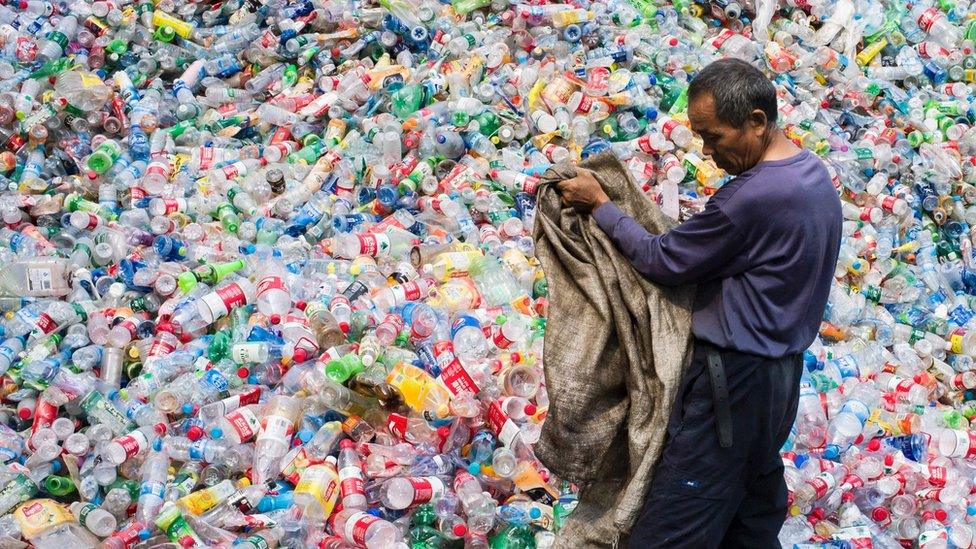Is it easier or harder to live without plastic than 10 years ago?
- Published
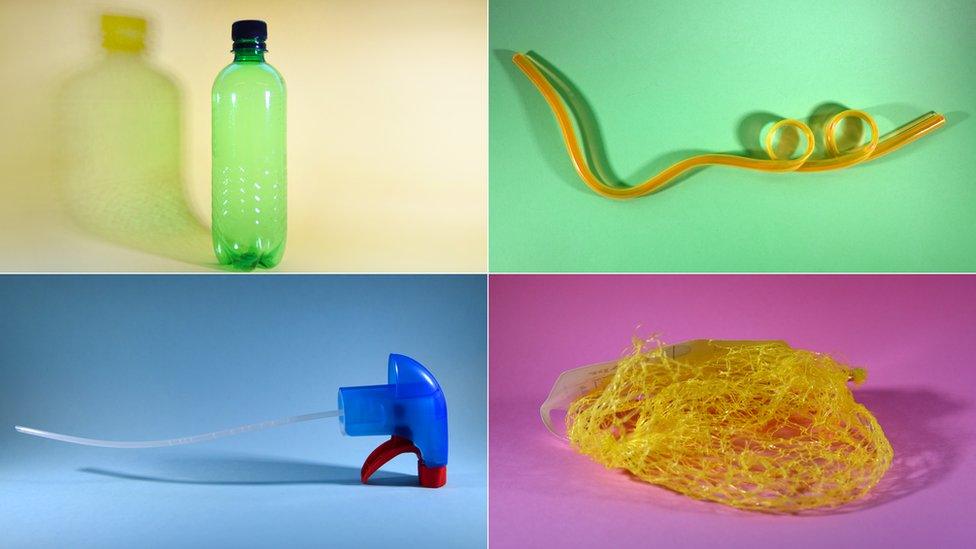
Ten years ago I attempted to live plastic-free. With the government pledging to crack down on plastic waste, will it be any easier a decade on?
Summer 2008 was a warm one. I know that because my kitchen gently hummed with the sour scent of plastic milk bottles and yoghurt cartons.
During that July, I saved all 603 plastic items my husband, toddler and I generated so I could compare with an experimental month "off" plastic, external in the August that followed.
The project was triggered by a BBC report on plastic pollution in the middle of the Pacific Ocean, external, which left me wondering if it was possible to eliminate disposable plastic from normal daily life.
The answer was: "not quite". But that August we reduced our plastic tally to just 116 items, of which 63 were disposable nappies.
Ten years later, nappies are no longer in my shopping trolley. It's now laden with the full range of groceries consumed by a family with two school-age children.
Much of it is packed in plastic - and it's easy to see why: this lightweight, durable material keeps food fresh and is easy to move and store.
But with avoiding disposable plastic high on many people's to-do lists, I decided to rerun my 2008 experiment.
Would spending a month without buying anything wrapped in, or containing, plastic be any easier now?
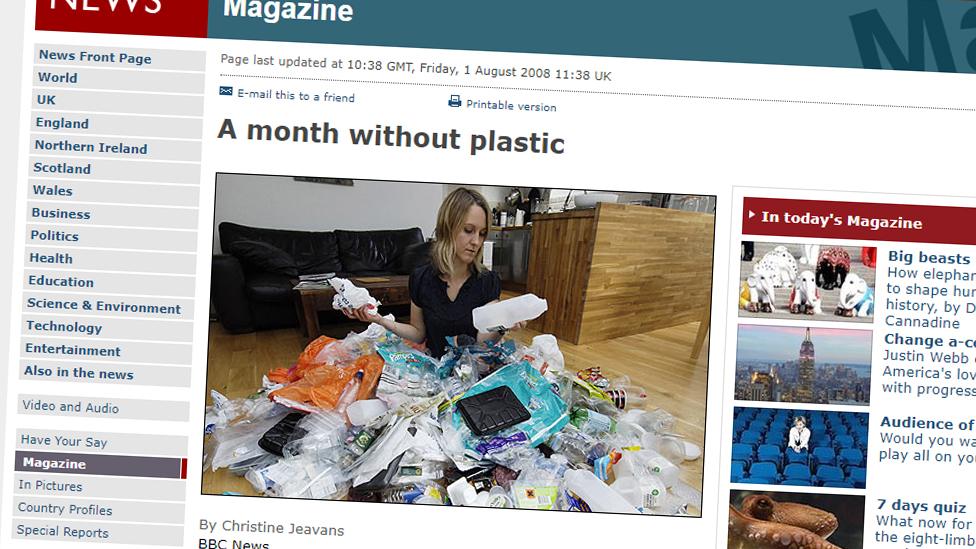
Week 1 - breakfast battle
I tackle our breakfast routine first. We awake to milk on the doorstep, in glass bottles, just like in my childhood, albeit ordered online rather than via handwritten note.
The kids are amused by the novelty and I overhear my eight-year-old daughter telling a friend: "They appear outside our house overnight."
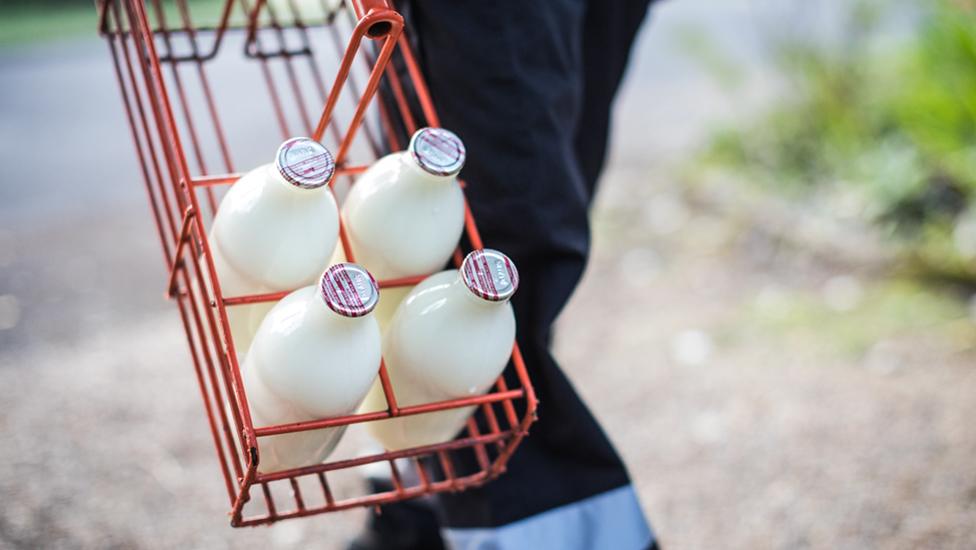
Milk doorstep delivery new subscriptions have risen since the start of January
It seems we are not alone in making the switch in 2018.
Müller-owned delivery company Milk & More says it has had 10,000 new online customers signing up since 1 January, of which 90% are ordering milk in glass bottles.
It comes despite a long term downward trend for milk deliveries which last year accounted for just 3% by volume of the milk sold - down from 7% in 2008.
Delivered milk is more costly: a glass doorstep pint is around 81p, whereas a four-pint supermarket bottle is about £1.10. But not having to pick up milk has already cut my "top-up" trips to the local convenience store.
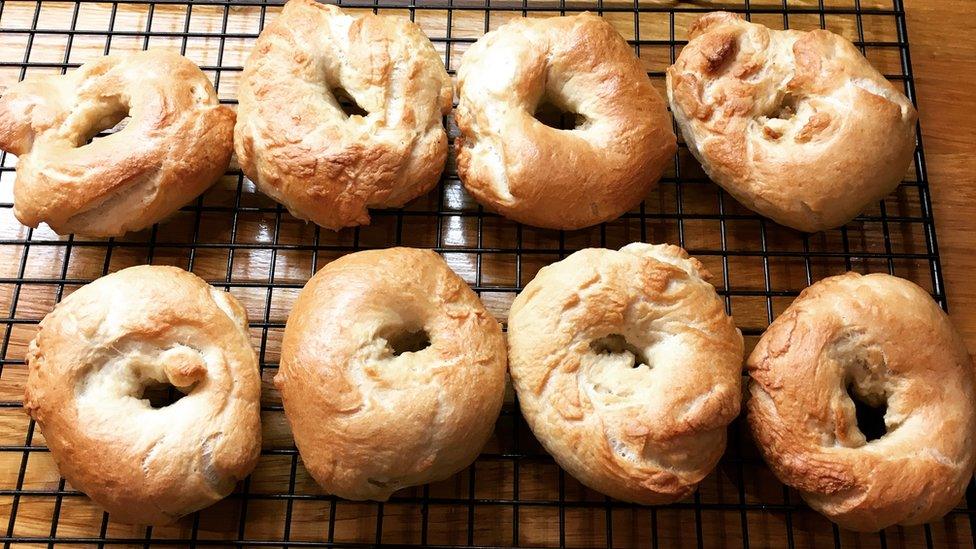
My homemade bagels won't win any prizes
Milk bottles are one of the most widely and easily-recycled pieces of plastic packaging.
At the other end of the recyclability scale are plastic films such as bags, pouches and peelable lids which make up more than a quarter of plastic household waste.
As a family we are heavily reliant at breakfast time on bags of bagels and boxes of cereals with plastic inners.
This prompts me to try making bagels for the first time in my life - not as hard as you might think.
But as for cereals, my suggestion to the rest of the family that we all eat porridge for a month (boxes of oats have no liners) goes down like a gruel-filled balloon.
Then I find a new "zero waste" shop a couple of miles away that has versions of our usual options but loose in bins for scooping into our own containers. Family breakfast truce achieved.
Week 2 - the supermarket
There's no avoiding the fact that visiting separate shops for separate goods takes longer than my normal one-hit blitz at the supermarket.
So I decide to give my usual routine a try - but on my new avoid-plastic-at-all-costs rule.
Attempting to shop based on packaging status alone leads to some combinations worthy of Ready Steady Cook: leeks, carrots, a giant mango and a box of eggs.
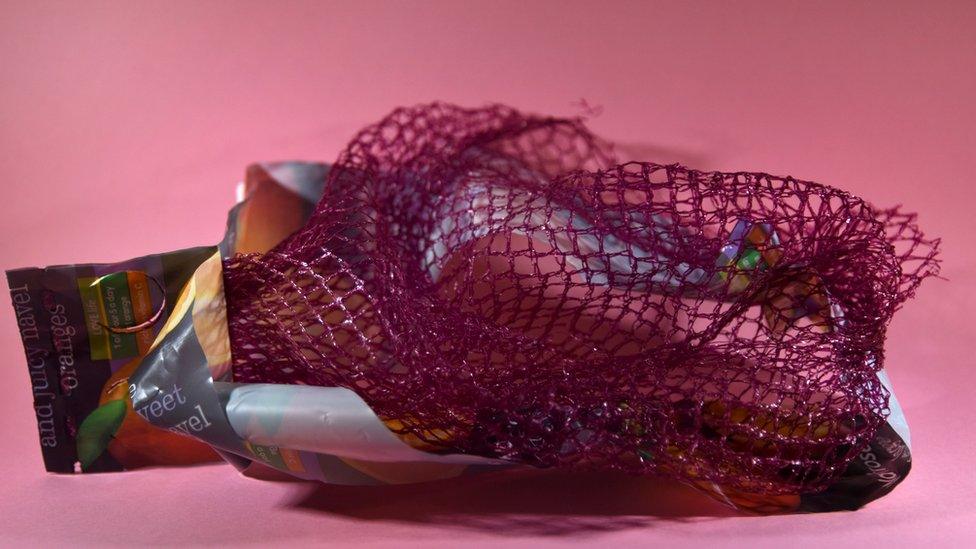
Films and nets are not currently easily recycled
Bags of salad are out, as is most pasta and rice. Tinned food is easier although cans of acidic foods such as tomatoes, or even fizzy drinks, have a plastic lining to stop the contents reacting with the metal.
Many glass jars have plastic lids or labels so items such as chocolate hazelnut spread are off the menu too (sorry kids) but I take a risk with some pasta sauces, wondering whether the synthetic rubber lining to the lids counts as plastic.
I'm reminded how heavy glass, tins and cardboard are - and, of course, have their own environmental impact - as I heave my trolley to the checkout.
Here, there is a major change since my original challenge. Single-use carrier bags are no longer dished out freely, since 2015 in England (and earlier in other parts of the UK) they cost at least 5p.
The levy has slashed usage by 83%, according to government figures. Several chains are now dropping the 5p bags altogether and only selling "bags for life".
Like so many shoppers, I'd brought my own reusable bags, so no rule-breaking there.
But the food on the shelves doesn't seem any less plastic-wrapped than a decade ago.
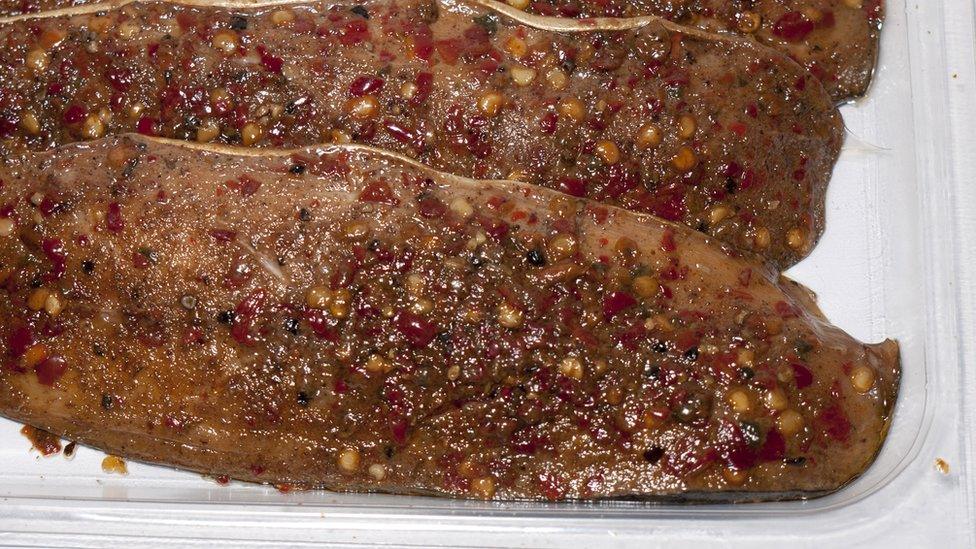
Retailers say shrink-wrapping fish and meat has cut the amount of plastic used and prolongs shelf life
However, Iain Ferguson, environment manager at the Co-op says food retailers have made many changes, they just may not be immediately visible.
"In the past 10 years a lot of work has gone into making plastic films thinner and plastic bottles lighter," he says.
Modifications such as removing polystyrene from pizza bases, switching tomato punnets to cardboard and packing meat in one type of plastic rather than layers of differing types are other moves the Co-op has made.
"Our customers say they want no plastic but customers also buy in plastic because they want the convenience," Mr Ferguson says.
"The best thing we can do is to make it easier to recycle."
All the major supermarkets insist they have made or are making significant changes and frozen food retailer Iceland has announced it will do away with plastic altogether, external for its own brand products by 2023.
Back to the pressing issue of family teatime, I grab a cardboard box of fish-fingers, some naked broccoli and loose potatoes. Giant mango for pudding.
Week 3 - beach effects
Half term and we travel from London to Cornwall.
Unfortunately I forget my reusable cup and water bottle and end up with a pile of junk from the journey down, adding to the 21 million water bottles, external and 6.8 million coffee cups, external the UK gets through each day.
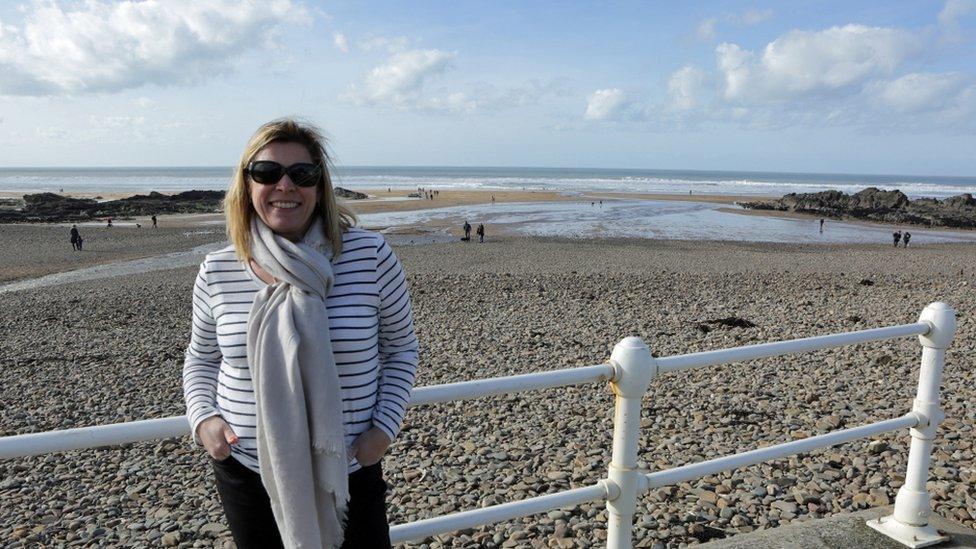
Avril Sainsbury of Bude Cleaner Seas says attitudes to plastic litter are changing
I turn to social media for a nudge back on track. Online campaigning has increased massively since 2008 and hashtags such as #oneless, #nomoresingleuse and #strawssuck, are all used to promote the idea that small changes can create a big effect.
Among them is my children's favourite - #2minutebeachclean, external which started in the north Cornish seaside resort of Bude in 2014.
Known for its long sandy beaches and rolling surf, the town sees the effects of plastic pollution every day, especially after a storm.
"It can feel overwhelming," says Avril Sainsbury of water quality project Bude Cleaner Seas, external as we survey Crooklets Beach together.
"You will see everything that you'll find in your home, disposable lighters, bottles, caps, seals - to ghost nets, which are [abandoned] fishing nets."
But she says attitudes to marine litter are changing and people are now more likely to say "gosh I'll help you" if they see a beach clean taking place.
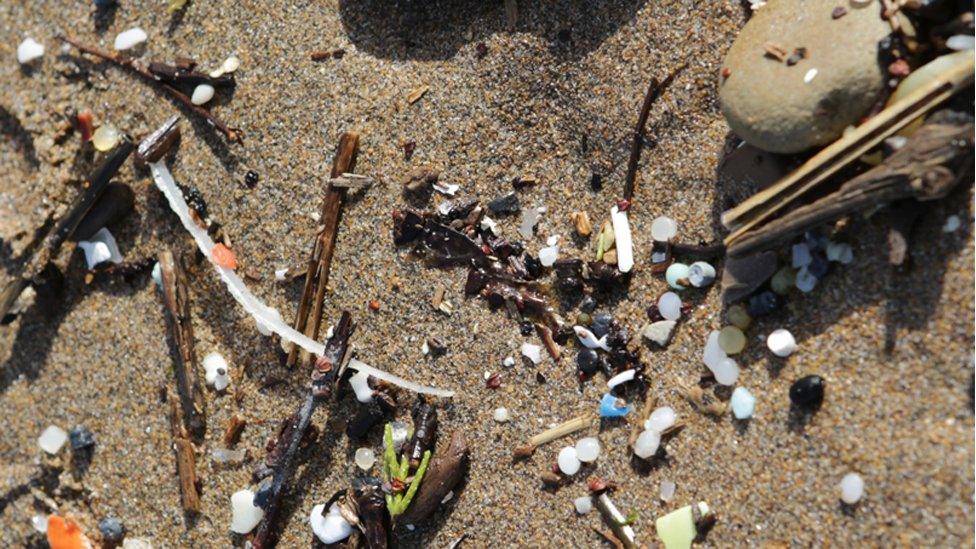
Micro plastics mingle with the sand on Crooklets Beach in Bude
I'm feeling guilty about those water bottles and coffee cups from the journey but Bude is a practical place. Local teacher Deb Rosser has come up with a practical solution.
"You can go to anywhere in Bude - that can be cafes, shops and accommodation providers - and they will refill your bottle for free with pure Cornish tap water," says Deb, describing her Refill Bude, external concept which has spread nationwide since starting in 2014.
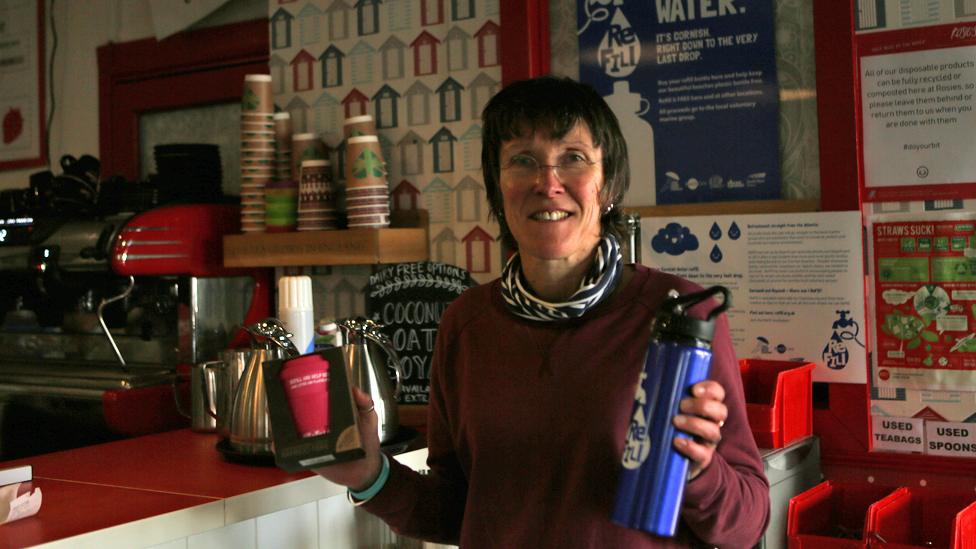
Sales of branded Refill Bude cups and bottles have raised more than £5,000 for Bude Sea Pool
There are now 7,800 refill points around the UK and I find a new one in Boscastle National Trust Cafe, near where we are staying.
The manager says the cafe has also just swapped from cardboard cups and plates to crockery. No excuse then for plastic-free fails while we're on holiday.
Week 4 - the verdict
Back at home and some plastic-packed toiletries run out this week. I purchase a bamboo toothbrush (admittedly with nylon bristles), and get to grips with a shampoo bar instead of a bottle.
Our stock of toilet paper holds out, just, but I research a paper-wrapped alternative that can be delivered.
At the end of the month, we have not managed to live entirely plastic-free but we have cut down on our normal consumption.
It's taken a lot more time but has not necessarily been more expensive as it's forced me to limit what I buy.
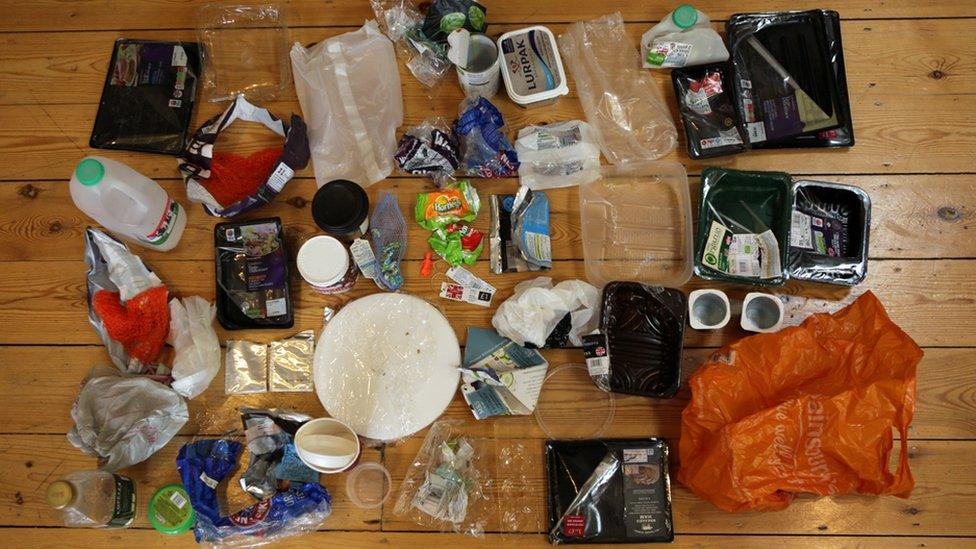
My 48-item plastic tally for the month
The tally for the month comes to 48 plastic items including:
Five ham packets - several packed lunch fails
Three cereal inners
Two chicken packs
A polystyrene pizza base
Chocolate mini eggs - they were foil wrapped but in a plastic net
Two jelly wrappers
A sachet of yeast from making those bagels
Once nappies are taken out of the equation, it's not too different from the 53 items I gathered during my experiment 10 years ago.
Yet looking back on my normal consumption in 2008, there have been big changes.
Then, I used 36 disposable carrier bags a month, got through 23 polystyrene coffee cups at work and a plastic water bottle every other day.
Now, my office has a stock of mugs, and taking a reusable bag and water bottle everywhere with me has become second nature.
The same can't be said for plastic-free food shopping.
While I will keep some of my swaps (including the milk delivery) I do find it currently impractical to keep my family fed without buying any plastic at all.
However, with changes coming thick and fast - plastic-free teabags, the deposit return scheme, stores encouraging customers to bring their own containers - I may not need to wait 10 more years to give it another try.
- Published24 January 2018
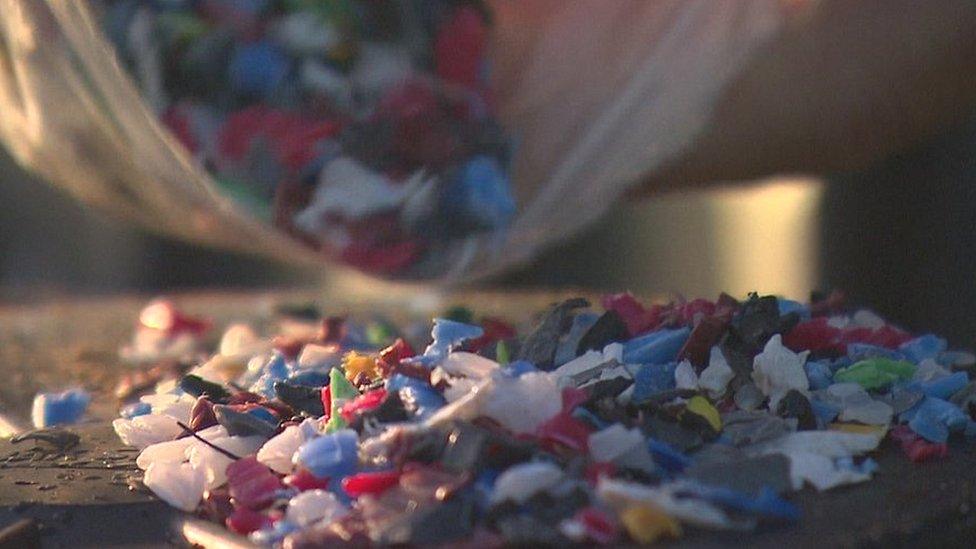
- Published4 December 2017
- Published10 December 2017
